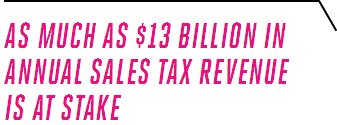 Photo by Sean Gallup / Getty Images |
 Photo by Sean Gallup / Getty Images |
In the wake of yesterdayís Supreme Court ruling, e-commerce companies are understandably both concerned and uncertain of their future. The 5-4 verdict overruled a 1992 precedent set by the case Quill v. North Dakota that only addressed mail-order businesses at the time, but it became a powerful legal bedrock for the e-commerce industry. It let companies without a robust physical infrastructure thrive during and after the dot-com boom by exempting purchases from sales tax, so long as the seller did not have a physical operation in the state where the customer resided. Now, following the courtís decision, states can start charging sales tax on internet purchases even when a retailer has no physical presence in that state.
A number of retailers, from Amazon to Etsy to Overstock.com, may be impacted. Itís not necessarily because those corporations have been skirting sales tax collection, but some enable thousands of third-party sellers to do so, largely thanks to Quill v. North Dakota. In fact, Amazon, which last year started collecting sales tax in all 45 states that require it by law, may have a substantial amount of work to do to help its Amazon Marketplace sellers stay compliant. Yet we donít know if that burden will fall primarily on Amazon or if it will be the responsibility of the sellers.
More than 50 percent of all sales on the site are conducted via third-party sellers, some of which use Amazon for fulfillment but otherwise operate independent small- to medium-sized businesses. A few companies, like Chinese electronics giant Anker, have thousands of employees and an international footprint, suggesting the ruling could alter the prices of popular products on Amazon and how companies like Anker are able to operate in the US. (An Anker spokesperson said it was too early for the company to comment on how the ruling would impact its business.) Etsy, eBay, and others are in similar boats. According to the US Government Accountability Office, as much as $13 billion in annual sales tax revenue is at stake.
 Amazon did not respond to a request for comment, nor did it release a statement on the ruling. But Etsy CEO Josh Silverman said in a statement, "While todayís decision is not the one for which we advocated, the Supreme Court did acknowledge the important difference between big internet retailers and the creative entrepreneurs on our platform." Etsy is concerned about what it sees as "significant complexities in the thousands of state and local sales tax laws" and that by overruling the Quill decision, the Supreme Court has put the ball in Congressí court. "We believe there is now a call to action for Congress to create a simple, fair federal solution for micro-businesses," Silverman added.
Amazon did not respond to a request for comment, nor did it release a statement on the ruling. But Etsy CEO Josh Silverman said in a statement, "While todayís decision is not the one for which we advocated, the Supreme Court did acknowledge the important difference between big internet retailers and the creative entrepreneurs on our platform." Etsy is concerned about what it sees as "significant complexities in the thousands of state and local sales tax laws" and that by overruling the Quill decision, the Supreme Court has put the ball in Congressí court. "We believe there is now a call to action for Congress to create a simple, fair federal solution for micro-businesses," Silverman added.
eBay echoed those sentiments. "As expressed in both the Supreme Courtís decision and throughout oral arguments, the operations of small businesses are different than large retailers, and state tax actions targeting them raise additional legal questions that are not addressed by this decision," eBay wrote in a statement. "Now is the time for Congress to step in and provide clear tax rules, with a strong small business exemption, to help small businesses take advantage of the Internet to grow and create local jobs."
For the online businesses specifically cited in the case ó Newegg, Overstock, and Wayfair ó the ruling has been met with more pushback and calls to for congressional action. Wayfair, in a statement given to The Verge, says it already collects sales tax on about 80 percent of all sales, and that it has "long supported a legislative solution that would establish a level playing field for brick-and-mortar and online retailers."
Yet while the decision was "not the ideal venue for creating this level playing field," Wayfair hopes for more clarity on the issue down the line. Overstock ó which, like Wayfair and Amazon Marketplace, lets third-party companies sell on its website ó said the same. "Unless Congress responds, the Courtís ruling may remove key entrepreneurial opportunities before they even get out of the heads of the inventors," Overstock board member Jonathan Johnson said in a statement. Newegg did not respond to a request for comment.
 Photo by Michele Doying / The Verge |
At the heart of the matter is how the ruling will be clarified in further litigation and what exemptions there may be for small businesses now that the Supreme Court has bounced the decision back to the lower courts. Because the Supreme Court simply overruled the Quill decision and did not make constitutional the South Dakota law that initially raised the issue, the case may be litigated for years to come to figure out how to account for the over 10,000 state jurisdictions that govern sales tax across the country. That is, unless congressional legislation supersedes the state court decisions.
Notably, the South Dakota law that kicked off the debate put in a $100,000 annual sales threshold, or in the absence of that, a 200 in-state transaction limit. According to Berin Szůka, the president of nonprofit technology think tank TechFreedom, thatís a threshold "so low it would sweep in all but the very tiniest of online retailers." Now, "litigation will begin immediately, state-by-state, over how small is too small," he argued. "There is only one alternative to waiting years for the courts to resolve these questions: federal legislation," he added, pointing out that "Congress is far more capable of resolving highly fact-dependent policy questions than the courts."
A large part of the issue is not just that there are so many jurisdictions involved around the country that may make operating a small business that engages in interstate commerce exceedingly complicated. Itís also that, within those jurisdictions, certain products may be taxed differently depending on minute differences, like whether the product contains a certain ingredient. As Supreme Court Chief Justice John Roberts wrote in his dissenting opinion, items like deodorant with antiperspirant are taxed in Texas at a rate of 6.25 percent, while deodorant without antiperspirant is not taxed at all. And yarn sold to residents of New Jersey is exempt from sales tax so long as it is designated as yarn for sweaters and not another type of fabric-based product.
 Even groups that were in favor of the ruling, like the nonpartisan research institute the Information Technology and Innovation Foundation, are imploring Congress to act. "This ruling ensures that major online businesses cannot operate as virtual sales tax havens, allowing consumers to avoid paying their fair share of sales taxes and unfairly competing with other online and brick-and-mortar retailers," wrote Daniel Castro, the vice president for the group. "The ruling is the right step forward for the digital economy. E-commerce has grown up."
Even groups that were in favor of the ruling, like the nonpartisan research institute the Information Technology and Innovation Foundation, are imploring Congress to act. "This ruling ensures that major online businesses cannot operate as virtual sales tax havens, allowing consumers to avoid paying their fair share of sales taxes and unfairly competing with other online and brick-and-mortar retailers," wrote Daniel Castro, the vice president for the group. "The ruling is the right step forward for the digital economy. E-commerce has grown up."
However, Castro added that "states have a history of enacting laws and regulations that discriminate against online businesses to boost local businesses." He argues that Congress should "resist any attempts by states to place undue burdens on e-commerce," so as to protect both small businesses and the consumers who would largely suffer from higher prices placed on products in the event of high-tax sales and burdensome compliance costs.
Itís too early to tell how exactly this will shake out across the country and for businesses as large and complex as Amazon, Etsy, eBay, and the many other product-specific sites modeled like those marketplaces. But itís clear that, in paving the way for states to modernize their approaches to internet sales tax, grave consequences exist for both consumers and businesses in the absence of sensible legislation.
The Supreme Court, in its majority opinion, assumes software tools, similar to an existing one Amazon offers its Marketplace sellers, will step in to help simplify tax collection and the other cumbersome tasks that may arise as ripple effects of the ruling. But those tools donít yet exist. In the meantime, everyone is left scratching their heads and looking to an increasingly gridlocked Congress for answers.